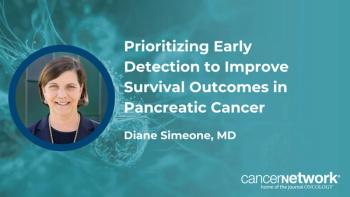
Expert Seeks to Assess Opioid Access Disparities in Younger Cancer Population
After assessing racial disparities in opioid access in older patients with cancer, an expert from Dana-Farber Cancer Institute speaks to the need for examining younger populations and those with different insurance types.
Assessing disparities in opioid access among younger patients with cancer and those who have different insurance types, such as Medicaid or commercial insurance, should be a future area of focus, according to Andrea C. Enzinger, MD.
In an interview with CancerNetwork®, Enzinger, an assistant professor of medicine at Harvard Medical School and a medical oncologist at Dana-Farber Cancer Institute, discussed how these areas of focus will work to build on a study investigating racial and ethnic disparities in opioid access for patients with cancer near the end of life. In particular, she emphasized that the degree of disparities observed in the study are likely quite larger than the data indicated, as it primarily included older patients.
In addition to investigating disparities in younger populations, Enzinger indicated that future research should also explore systems and mechanisms that may perpetuate inequal access to opioids across different communities. She suggested that follow-up studies will clarify whether factors such as poverty or rurality impacted a patient’s likelihood of having access to opioids.
Transcript:
Our team is planning a number of follow-up studies; there are some important unanswered questions. This is the largest study to date to look at the magnitude and the scope of opioid access disparities in cancer populations. But we’re just looking at older populations with terminal cancer, and it’s important to highlight that the degree of disparities we see here are probably much larger if you look at younger populations or if you look at those with mixed-insurance types.
We are really interested in looking at disparities in younger populations and those who may have Medicaid or commercial insurance. We’re also interested in looking at different phases of cancer care, for example, during definitive cancer treatment or after surgery.
It’s really important to know where the disparities are the worst. The other thing that our team is really interested in looking at is mechanisms and why this is happening. We tried to look at a few possible mechanisms by running models that adjusted for the characteristics of patients and communities where they lived, as well as how deprived the communities were.
We are wondering if this was all due to structural factors. Adjusting for that, for poverty, and for whether patients lived in urban or rural communities really made no difference on the magnitude of the disparities that we saw.
Reference
Enzinger AC, Ghosh K, Keating NL, et al. Racial and ethnic disparities in opioid access and urine drug screening among older patients with poor-prognosis cancer near the end of life. J Clin Oncol. Published online January 10, 2023. doi:10.1200/JCO.22.01413
Newsletter
Stay up to date on recent advances in the multidisciplinary approach to cancer.



















































